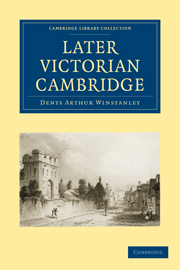Book contents
- Frontmatter
- D.A.W. A Memorial Note
- Contents
- PREFACE
- Chapter I ROBINSON'S VOTE
- Chapter II THE JUDGES AND TRINITY COLLEGE
- Chapter III THE RELIGIOUS TESTS (1862–1871)
- Chapter IV THE CAMBRIDGE UNIVERSITY AND CORPORATION ACT
- Chapter V EDUCATIONAL REFORM (1860–1880)
- Chapter VI THE TRINITY REFORMERS
- Chapter VII THE STATUTORY COMMISSIONERS AND THE UNIVERSITY
- Chapter VIII THE STATUTORY COMMISSIONERS AND THE COLLEGES
- Index
Chapter II - THE JUDGES AND TRINITY COLLEGE
Published online by Cambridge University Press: 07 September 2010
- Frontmatter
- D.A.W. A Memorial Note
- Contents
- PREFACE
- Chapter I ROBINSON'S VOTE
- Chapter II THE JUDGES AND TRINITY COLLEGE
- Chapter III THE RELIGIOUS TESTS (1862–1871)
- Chapter IV THE CAMBRIDGE UNIVERSITY AND CORPORATION ACT
- Chapter V EDUCATIONAL REFORM (1860–1880)
- Chapter VI THE TRINITY REFORMERS
- Chapter VII THE STATUTORY COMMISSIONERS AND THE UNIVERSITY
- Chapter VIII THE STATUTORY COMMISSIONERS AND THE COLLEGES
- Index
Summary
When and how it came about that the Judges of Assize stay at Trinity Lodge, when visiting Cambridge, can only be conjectured; but the custom probably goes back to the reign of James I, and may have been started by Sir Edward Coke. Coke came to Cambridge on circuit in 1607 and the five following years, and in two of those years almost certainly stayed in Trinity. The accounts of the Trinity Steward for 1610 contain the following items–“for glasses, trenchers, candells, pipkins, potts, trencher knives etc. bought against Lent Assizes”–“for washing the Lord Cooke's Lynnen then”, and similar items appear in the same officer's accounts for 1612, as for instance–“laid out at Lent Assizes for glasses, candells, trenchers, potts and pipkins”–“for washing the Lynnen then”–“for candells, trenchers, glasses, potts and rushes at Midsummer Assizes”–“for washing Lynnen.” And Coke may have stayed in Trinity during his other circuit visits, though there is no evidence that he did so, as the Steward's accounts for those years have not survived. And though it would be rash to assert that no previous Assize Judge had been accommodated in the college, this may well be the case. A fair number of the Stewards' accounts for the years before 1607 are still in existence; and none of them contain any statements which can be connected with judicial visits. Moreover in 1580, and not for the first time, the Judges lodged at the Dolphin Inn.
- Type
- Chapter
- Information
- Later Victorian Cambridge , pp. 20 - 35Publisher: Cambridge University PressPrint publication year: 2009First published in: 1947



